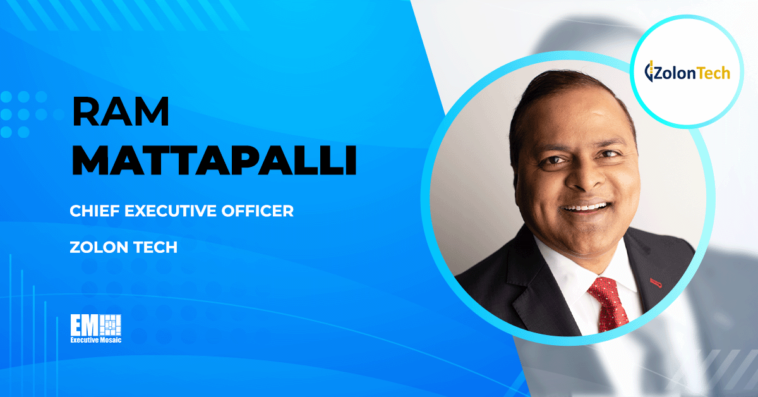Ram Mattapalli embodies the self-starter ethos in government contracting, having established the strategic information technology company Zolon Tech in 1998 and grown it exponentially over the last more than 25 years. Zolon has matured into a reliable provider of cybersecurity, cloud, mobile device management and app development to national security, defense and intelligence agencies. The company has received a level three designation in the SAMPI A Cybersecurity Maturity Model Integrated, placing it in the rarefied echelon of an international class of IT organizations.
A dedicated entrepreneur and investor, Mattapalli has remained Zolon’s CEO throughout the company’s upward trajectory. He is committed to ensuring that, along with Zolon’s success, it remains engaged in community outreach — like the sponsorship of a high school robotics team and a collaboration with Child Help events, providing awareness of and assistance for victims of child abuse.
In this wide-ranging Spotlight interview, Mattapelli spoke with ExecutiveBiz about the most pressing threats facing the U.S., the centrality of cloud and artificial intelligence in today’s technology landscape and more.
Where are you seeing opportunities for expansion in Zolon’s portfolio? What new capabilities or markets are you eyeing?
As the founder and CEO of Zolon Tech , it’s important to me to maintain a comprehensive understanding of the dynamic landscape within our industry. This requires me to remain aware of geopolitical shifts, technological advancements and societal exigencies, particularly within the domains of national security, digital transformation, health services, border patrol technology and veterans affairs.
Within the realm of national security, we are presented with compelling prospects for innovation and service provision. Our pursued interest encompasses the development of advanced encryption technologies, the fortification of cybersecurity frameworks and the refinement of intelligence analytics. By leveraging our expertise, we ensure our innovations will help to play an instrumental role in safeguarding our nation’s security interests. Similarly, in the sphere of digital transformation, our mission is to facilitate the modernization efforts of organizations by harnessing emergent technologies. Whether it pertains to cloud computing, artificial intelligence, data analytics or border patrol technology, our solutions will enhance operational efficacy, optimize citizen services and foster economic advancement.
Moreover, the imperative to address the needs of our veterans and bolster border security cannot be overstated. Through our engagements in veterans affairs, we endeavor to deliver solutions that streamline healthcare services, facilitate transition into civilian life and honor the sacrifices of those who have served. Simultaneously, our commitment to border patrol technology will highlight our dedication to fortifying national borders, ensuring homeland security and upholding the integrity of immigration processes.
While on our current path our company is uniquely positioned to capitalize on the multifaceted opportunities within government contracting. By remaining agile, innovative and focused on societal welfare, we are poised to effect tangible and enduring change in the domains of national security, digital transformation, health services, border patrol technology and veterans affairs.
What do you think are the most pressing national security threats we’re facing today? How is your organization addressing these threats?
I find that it’s extremely important and imperative for us to remain vigilant and proactive in addressing the evolving landscape of national security threats. In recent years the industry has observed a significant rise in multifaceted challenges that pose risks to our homeland security and democratic values. Three prominent areas of concern are malicious information campaigns, national and foreign issues impacting homeland security and the phenomenon of transnational repression.
Firstly, malicious information, particularly in the digital sphere, has emerged as a potent threat to our national security. The proliferation of fake news, disinformation campaigns and malicious cyber activities orchestrated by state and non-state actors can undermine public trust, sow discord and manipulate public opinion. Our company recognizes the importance of combating malicious information through innovative technologies, robust cybersecurity measures and strategic partnerships with government agencies to safeguard our democratic institutions and promote media literacy.
Secondly, national and foreign issues present complex challenges that necessitate a comprehensive approach to homeland security. From terrorism and extremism to cybersecurity breaches and geopolitical tensions, the threats we face are diverse and constantly evolving. Zolon remains committed to providing cutting-edge solutions that enhance intelligence capabilities, border security measures, critical infrastructure protection and emergency response readiness. By leveraging advanced analytics, threat intelligence and interagency collaboration, we can effectively mitigate risks and bolster our nation’s resilience against emerging threats.
Lastly, the phenomenon of transnational repression poses a unique set of challenges to homeland security and human rights. As authoritarian regimes extend their reach beyond their borders to target dissidents, journalists and activists, the need for robust diplomatic, legal, and technological responses becomes increasingly apparent. At Zolon we are dedicated to supporting efforts to counter transnational repression by developing tools and initiatives that promote freedom of expression, protect vulnerable populations, and hold perpetrators of human rights abuses accountable.
In conclusion, we recognize the gravity of current national security threats. By remaining proactive, adaptive and collaborative in our approach, we are committed to supporting government efforts to safeguard our nation’s security, uphold democratic values and preserve global stability.
Tell me about the current state of the artificial intelligence market. Where are you seeing new opportunities in AI, and where do you think the market is heading?
I have a unique vantage point on the current state of the AI market and its implications for our industry. The artificial intelligence market is experiencing unprecedented growth and innovation. We’re witnessing a proliferation of AI technologies across diverse sectors, from finance and healthcare to defense and government. This surge in adoption is driven by several factors, including advancements in machine learning algorithms, increased computing power, and the growing availability of big data. In terms of new opportunities in AI, we’re particularly excited about its applications in cybersecurity. As cyber threats become more sophisticated and pervasive, there’s a growing need for intelligent solutions that can detect, prevent and respond to cyber-attacks in real-time. Zolon strives to be at the forefront of developing AI-powered cybersecurity tools that leverage machine learning and predictive analytics to identify and mitigate threats proactively. Whether it’s detecting anomalous behavior, analyzing network traffic patterns, or automating incident response workflows, AI holds immense potential for strengthening cyber defenses and safeguarding critical infrastructure.
Additionally, we’re seeing promising opportunities for AI in areas such as autonomous systems, natural language processing and data analytics. In the government sector, AI-driven technologies have the potential to revolutionize decision-making processes, optimize resource allocation and improve citizen services. From autonomous drones and intelligent surveillance systems to chatbots and virtual assistants, the possibilities are limitless.
One of the notable benefits of AI, including generative AI, is its ability to improve employee performance and save time. By automating routine tasks and providing intelligent insights, AI empowers employees to focus on higher-value activities that require human judgment and creativity.
For example, in cybersecurity, AI-driven tools can automate threat analysis, identify vulnerabilities and prioritize security alerts, allowing cybersecurity professionals to allocate their time more effectively to strategic initiatives and proactive threat mitigation efforts. Looking ahead, we believe the AI market will continue to expand and diversify as organizations across industries recognize the transformative power of artificial intelligence. We anticipate greater investment in AI research and development, increased collaboration between industry and academia, and a continued focus on ethical and responsible AI deployment. Moreover, as AI technologies mature and become more accessible, we expect to see widespread adoption among organizations of all sizes, driving further innovation and economic growth.
What opportunities can be unlocked with the cloud, and how do you think those opportunities will change the federal landscape?
The future shows that there are profound opportunities that cloud computing presents for both our organization and the federal landscape. Enterprise within the cloud offers unparalleled scalability and flexibility by allowing government agencies to rapidly deploy and scale IT resources based on fluctuating demands. This elasticity enables agencies to optimize resource utilization, reduce operational costs and enhance agility in responding to evolving mission requirements. Secondly, the cloud facilitates greater collaboration and data-sharing among government entities, enabling seamless integration of systems and interoperability of services. By leveraging cloud-based platforms and tools, agencies can break down silos, streamline workflows, and foster a culture of innovation that drives mission success.
Moreover, the cloud enables advanced data analytics and artificial intelligence capabilities, empowering agencies to derive actionable insights from vast volumes of data. By harnessing the power of cloud-based analytics tools, agencies can make data-driven decisions, enhance situational awareness and improve mission outcomes across a wide range of domains, from cybersecurity and healthcare to emergency response and national security. In addition, the cloud enhances cybersecurity posture by providing advanced security features and robust compliance frameworks. Cloud service providers invest heavily in state-of-the-art security technologies and adhere to stringent security standards, helping agencies mitigate cyber risks and safeguard sensitive information more effectively than traditional on-premises systems. Overall, the adoption of cloud computing in the federal landscape has the potential to revolutionize the way government agencies operate, deliver services and fulfill their missions. By embracing cloud technologies, agencies can unlock new levels of efficiency, innovation and collaboration that will ultimately enhance the effectiveness and responsiveness of government in serving the needs of citizens and advancing national priorities.





